روضه حضرت رقیه
حضرت فاطمه صغري (رقيه) عليها سلام، دختر سه ساله امام حسين (علیه السلام) عصر روز سه شنبه در خرابه در كنار حضرت زينب(سلام الله علیها) نشسته بود. جمعي از كودكان شامي را ديد كه در رفت و آمد هستند.
پرسيد: عمه جان! اينان كجا مي روند؟ حضرت زينب(سلام الله علیها) فرمود: عزيزم اين ها به خانه هايشان مي روند. پرسيد: عمه! مگر ما خانه نداريم؟ فرمودند: چرا عزيزم، خانه ما در مدينه است. تا نام مدينه را شنيد، خاطرات زيباي همراهي با پدر در ذهن او آمد.
بلافاصله پرسيد: عمه! پدرم كجاست؟ فرمود: به سفر رفته. طفل ديگر سخن نگفت، به گوشه خرابه رفته زانوي غم بغل گرفت و با غم و اندوه به خواب رفت. پاسي از شب گذشت. ظاهراً در عالم رؤيا پدر را ديد. سراسيمه از خواب بيدار شد، مجدداً سراغ پدر را از عمه گرفت و بهانه جويي نمود، به گونه اي كه با صداي ناله و گريه او تمام اهل خرابه به شيون و ناله پرداختند.
خبر را به يزيد (لعنة الله علیه) رساندند، دستور داد سر بريده پدرش را برايش ببرند. رأس مطهر سيد الشهدا را در ميان طَبَق جاي داده، وارد خرابه كردند و مقابل اين دختر قرار دادند. سرپوش طبق را كنار زد، سر مطهر سيد الشهدا را ديد، سر را برداشت و د رآغوش كشيد.
بر پيشاني و لبهاي پدر بوسه زد و آه و ناله اش بلند تر شد، گفت: پدر جان چه كسي صورت شما را به خونت رنگين كرد؟ پدر جان چه كسي رگهاي گردنت را بريده؟ پدر جان «مَن ذَالَّذي أَيتَمَني علي صِغَرِ سِنِّيِ» چه كسي مرا در كودكي يتيم كرد؟ پدر جان يتيم به چه كسي پناه ببرد تا بزرگ بشود؟ پدر جان كاش خاك را بالش زير سرم قرار مي دادم، ولي محاسنت را خضاب شده به خونت نمي ديدم.
دختر خردسال حسين(علیه السلام) آن قدر شيرين زباني كرد و با سر پدر ناله نمود تا خاموش شد. همه خيال كردند به خواب رفته. وقتي به سراغ او آمدند، از دنيا رفته بود. شبانه غساله آوردند، او را غسل دادند و در همان خرابه مدفون نمودند.
به دخترت زده اي سر فداي سر زدنت
فداي آتش داغي كه بر جگر زدنت
چقدر ناله كشيدم دگر نخوان قرآن
ولي تو خواندي و با سنگ اي پدر زدنت
به هيچ جاي سر تو كه جاي سالم نيست
ز بس كه هر سر بازار و هر گذر زدنت
خودت بگو سر نيزه چه بر سرت آمد؟
به روي نيزه كه بودي چرا مگر زدنت؟
ميان مجلس و در پيش روي عمه ومن
براي كشتن ما بوده بيشتر زدنت!
علی لعنة الله قوم الظالمین…
لباس ماتم
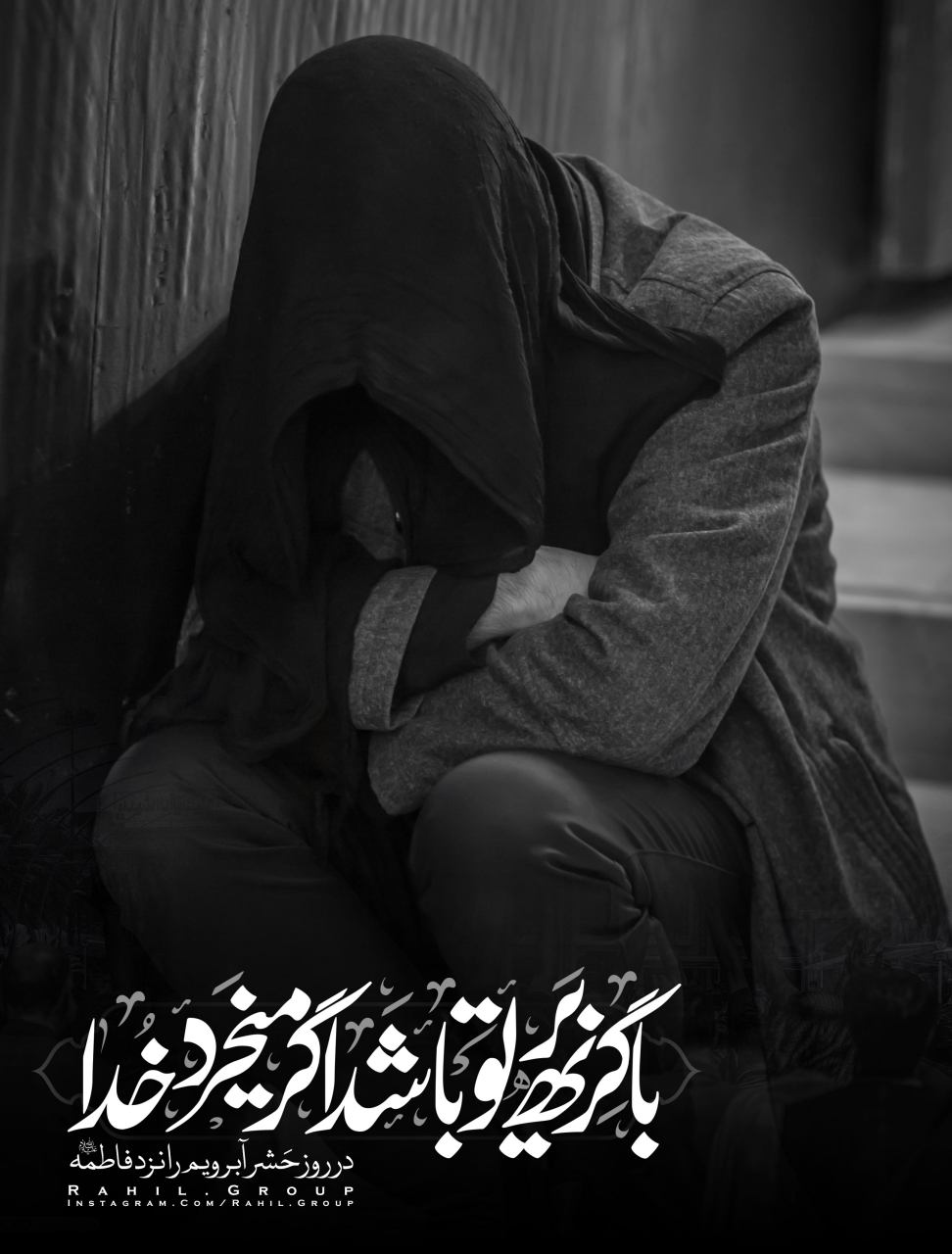
بُکاء بر مصائب اهل البیت (علیهم السلام) و به خصوص سیدالشهداء (علیه السلام) شاید از آن قبیل مستحباتی باشد که مستحبّی افضل از آن نیست! (بکاء مِن خَشیَةِ الله: گریه از ترس خداوند)، آن هم همین جور است، شاید افضل از آن نباشد!
آیت الله #بهجت
⚘⚘⚘⚘⚘⚘⚘⚘⚘⚘⚘⚘⚘⚘⚘⚘⚘
لباس سیاه برای عزای اهل البیت
آیت الله مرعشی نجفی رحمه الله علیه:
سفارش می کنم لباس سیاهی را که در محرم و صفر می پوشیدم جهت حزن و اندوه در مصیبت های آل رسول با من دفن شود.
*سیاه پوشی در سوگ ائمه نور علیه السلام ص 220.
?????????????????
بخش هایی از کتاب #کیمیای_وصل :
حضرت آیت الله سیدعلی قاضی(قدس سره) برای مجالس حسینی اهمیت و احترام فوق العاده ای قائل بودند و در مراسم روضه خوانی، کفش حاضران را ردیف کرده،آماده پوشیدن میکردند و چه بسا آن ها را با آستین لباس خود گردگیری می کردند و می گفتند:” من کفش حاضران در مجلس روضه اباعبدالله(ع) را تمیز میکنم تا ملائکه حاضر در این مجلس گواهی دهند به آنچه در باطن من می گذرد که جز خدای متعال کسی از آن اطلاع ندارد.”
علت پاداش عجیب و بسیار به زوار امام حسین علیه السلام ؟
➖➖➖➖➖➖➖
?ماجرای سیدبحرالعلوم
سید بحرالعلوم رحمة الله علیه به قصد تشرف به سامرا تنها به راه افتاد، در بین راه راجع به این مسئله، که گریه بر امام حسین(علیه السلام) گناهان را می آمرزد، فکر می کرد. همان وقت متوجه شد که شخصی عرب سوار بر اسب به او رسید و سلام کرد، بعد پرسید: جناب سید درباره چه چیز به فکر فرو رفته ای؟ و در چه اندیشه ای؟ اگر مسئله علمی است بفرمایید شاید من هم اهل باشم؟
سید بحرالعلوم گفت: در این باره فکر می کنم که چطور می شود خدای متعال این همه ثواب به زائران و گریه کنندگان بر حضرت سیدالشهدا (علیه السلام) می دهد مثلاً در هر قدمی که در راه زیارت برمی دارد، ثواب یک حج و یک عمره در نامة عملش نوشته می شود و برای هر یک قطره اشک تمام گناهان صغیره و کبیره اش آمرزیده می شود؟
آن سوار عرب فرمود: تعجب نکن! من برای شما مثالی می آورم تا مشکل حل شود.ـ سلطانی به همراه درباریان خود به شکار می رفت، در شکارگاه از همراهیانش دور افتاده و به سختی فوق العاده ای افتاد و بسیار گرسنه شد. خیمه ای را دید و وارد آن خیمه شد، در آن سیاه چادر، پیرزنی را با پسرش دید، آنان در گوشة خیمه عنیزه ای «بز شیرده» داشتند و از راه مصرف شیر آن، زندگی خود را می گرداندند. وقتی سلطان وارد شد، او را نشناختند، ولی به خاطر پذیرایی از مهمان آن بز را سر بریده و کباب کردند، زیرا چیز دیگری برای پذیرایی نداشتند.
سلطان شب را همان جا خوابید و روز بعد از ایشان جدا شد و به هر طوری که بود خود را به درباریان رسانید و جریان را برای اطرافیان نقل کرد. در نهایت از ایشان سؤال کرد: اگر بخواهم پاداش میهمان نوازی پیرزن و فرزندش را داده باشم، چه عملی باید انجام بدهم؟یکی از حضار گفت: به او صد گوسفند بدهید. دیگری که از وزراء بود، گفت: صد گوسفند و صد اشرفی بدهید.یکی دیگر گفت: فلان مزرعه را به ایشان بدهید.
سلطان گفت: هر چه بدهم کم است، زیرا اگر سلطنت و تاج و تختم را هم بدهم آن وقت مقابله به مثل کرده ام، چون آنها هر چه را که داشتند به من دادند من هم باید هرچه را که دارم به ایشان بدهم تا سر به سر شود.
سپس سوار عرب به سید فرمود: حالا جناب بحرالعلوم، حضرت سیدالشهداء(علیه السلام) هر چه از مال و منال و اهل و عیال و پسر و برادر و دختر و خواهر و سر و پیکر داشت همه را در راه خدا داد، پس اگر خداوند به زائرین و گریه کنندگان آن همه اجر و ثواب بدهد، نباید تعجب نمود، چون خدا که خدائیش را نمی تواند به سیدالشّهدا(علیه السلام) بدهد، پس هر کاری که می تواند انجام می دهد، یعنی با صرف نظر از مقامات عالی خودش، به زوّار و گریه کنندگان آن حضرت، در جاتی عنایت می کند در عین حال این ها را جزای کامل برای فداکاری آن حضرت نمی داند. چون شخص عرب این مطالب را فرمود، از نظر سید بحرالعلوم غایب شد. پس از غايب شدن سوار عرب، سيد فهميد كه جواب سؤالش را از امام زمان (عجل الله تعالی فرجه) دريافت كرده است.
————————————–
?«برگرفته از عبقری الحسان، مرحوم شیخ علی اکبر نهاوندی، ص 136»?????
ثواب زیارت
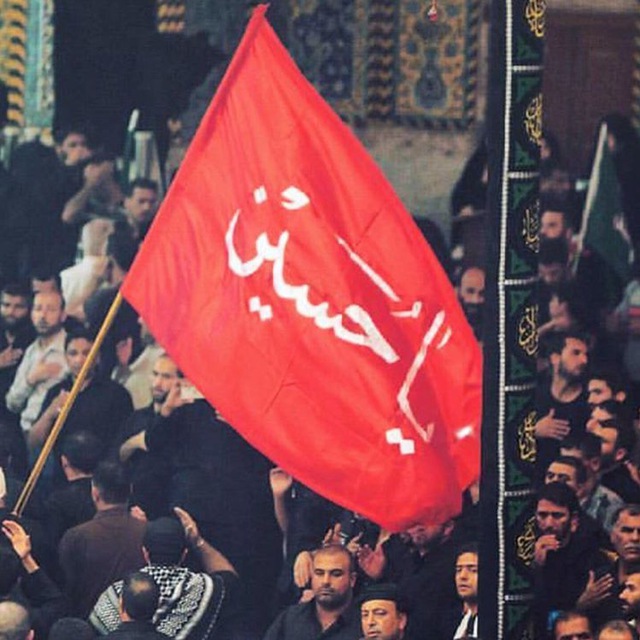
حداقل ثوابی که نصیب زائر امام حسين(ع) می شود…
قَالَ أَبُو الْحَسَنِ مُوسَى (ع) أَدْنَى مَا يُثَابُ بِهِ زَائِرُ الْحُسَيْنِ (ع) بِشَاطِئِ الْفُرَاتِ إِذَا عَرَفَ حَقَّهُ وَ حُرْمَتَهُ وَ وَلَايَتَهُ أَنْ يُغْفَرَ لَهُ مَا تَقَدَّمَ مِنْ ذَنْبِهِ وَ مَا تَأَخَّرَ.
??امام موسى کاظم عليه السّلام فرمودند:
كمترين ثواب و اجری كه به زائر امام حسين عليه السّلام در كنار شط فرات می دهند، اين است كه گناهان گذشته و آينده اش را مى آمرزند، مشروط به اين كه حق و حرمت و ولايت آن حضرت را بشناسد.
?كامل الزيارات، ص: 153
لباس مشکی
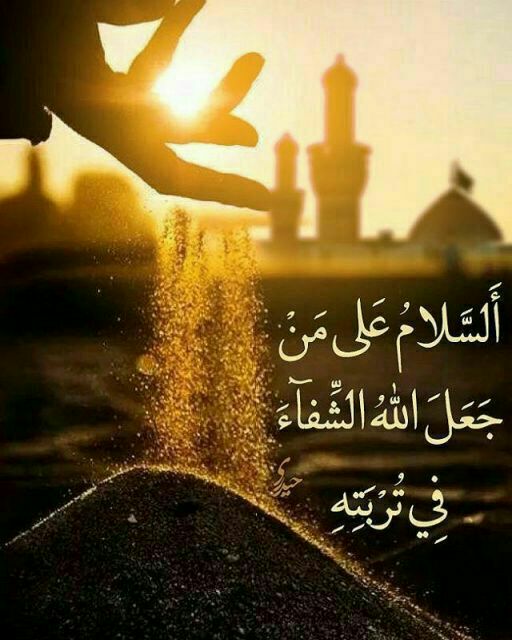
#پرسش_پاسخ
#شبهات
#محرم
⭕️ پوشیدن لباس مشکی حرام و لباس دوزخیان است :
1- قال امير المومنين (ع): لاتلبسوا السواد فانه لباس فرعون.
2- عن آبي عبدالله (ع): لا تصلّ فيها فإنّها لباس أهل النار.
✅ پاسخ
♦️بارها گفته ایم که اگر کسی میخواهد به روایت استناد کند باید تمام روایت های یک موضوع را مدنظر قرار دهد. این روایتها مربوط به کسی که لباس مشکی را به عنوان لباس رسمی و دائم خود انتخاب کند. یا اینکه در نماز لباس مشکی بر تن کند.
(? وسائل الشیعة، ج 3، ص 271)
♦️اما پوشیدن لباس مشکی نه تنها برای اهل بیت جائز است، بلکه طبق روایات بازماندگان میت تا سه روز بدون هیچ گونه کراهتی میتوانند لباس مشکی بپوشند. ولی بیش از آن کراهت دارد.
? در خصوص عزاداری بر امام حسین علیه السلام در روایتی از فرزند امام سجاد(ع) نقل شده است:
وقتی جدّم امام حسین (ع) شهید شد زنان بنیهاشم در عزای آن حضرت لباس سیاه پوشیدند و این لباس را در گرما و سرما تغییر نمیدادند
(? الحدائق الناظرة فی احکام العترة الطاهرة، ج 7، ص 118)
♦️از این روایت چنین به دست می آید پوشیدن لباس مشکی توسط اهل بیت، چند ماه به طول کشیده است. زیرا در آن آمده است: در گرما و سرما لباسشان را تغییر نمی دادند.
♦️ضمن آنکه در روایات برای پوشیدن لباس مشکی استثنائاتی نیز ذکر شده که علاقه مندان می تونند به کتاب ( روحانیت لباس نوشته محمد قربانی مقدم مراجعه کنند.)
The Child Martyr
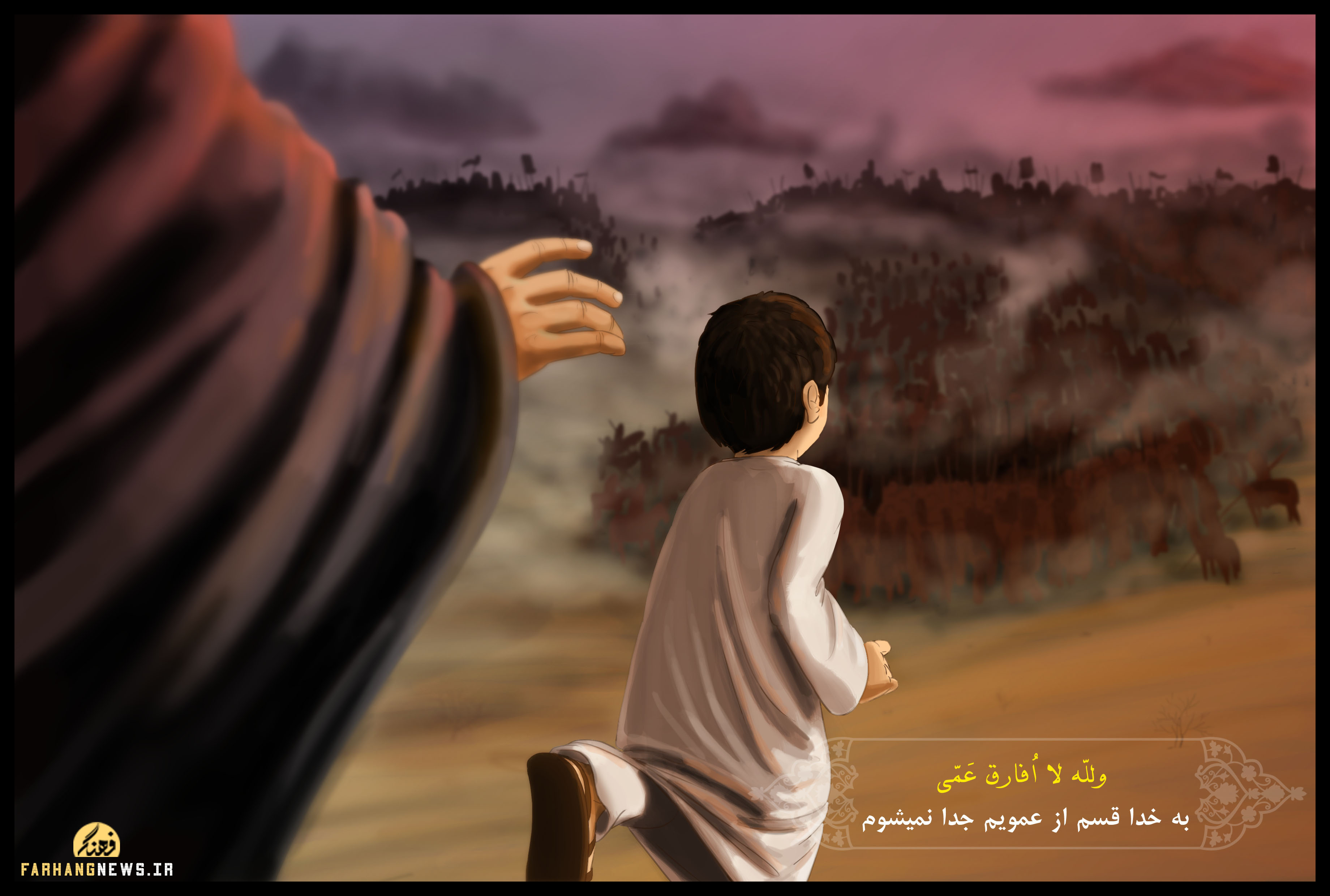
After the martyrdom of his father, Imam Hassan’s son Abdullah lived with his holy uncle, Imam Hussein (A.S) and loved him very much. Imam Hussein too had a great affection for his young nephew. “‘Abdullah went to Karbala with his uncle and saw everything that happened there.
He saw his young brothers and cousins putting on their suits of armor and, with the cry of “Allahu akbar’ and their swords whirling, rushing off to the battlefield. He saw them fighting battle with the enemies of religion and of the Qur’an, the disbelievers and hypocrites, and saw them killing them and being killed. He saw them drowned in their holy blood, giving life and strength to Islam with their martyrdom. When their bodies were brought to the special tent for the martyrs, Abdullah would go and weep over their bodies. He wanted to go to the battlefield and fight with the oppressors and defend Islam and its holy leader, lmam Hussein (A.S), but he was very young and they wouldn’t give him permission.
It was the day of ‘Ashura’ and all his friends, brothers and all of Imam Hussein’s valiant troops had been martyred. and ‘Abdullah had witnessed the martyrdom of them all.
Before they rushed off to the battlefield, he had heard everyone of the martyrs conveying their final goodbyes, and promising never to desert their leader and Imam or leave him on his own.
The last of Imam Hussein’s men had bravely given his life. He had been martyred. Now Imam Hussein himself left for the battlefield. Abdullah was standing near the martyrs’ tent, watching his uncle from a distance. An hour later, he couldn’t see his uncle any more. Without thinking he instinctively ran towards the battlefield. His aunt, Zeinab, wanted to stop him, but couldn’t. Abdullah wanted to find his uncle and defend him. Finally, he found him soaked in his own blood. Confused and dumbfounded, he stood staring at the bleeding face of his dear uncle. Imam Hussein opened his eyes and both of them saw each other.
Suddenly a sword was raised to deliver the final blow to Imam Hussein (A.S). Abdullah saw the flash of the sword and raised his head. “Do you want to kill my uncle you filthy traitor! he cried!” And immediately shielded his uncle’s bleeding body with his arm.
The sword fell. It cut off Abdullah’s arm, and the body of that brave and selfless youth fell on the chest of Imam Hussein (A.S). He attained martyrdom then and there giving the message of jihad and freedom to the youth of all times. With his last breaths, Imam Hussein (A.S) said to him, “My dear child, martyrdom is our honor. Your father Imam Hassan and your grandfather, the Holy Prophet, are waiting for you in Paradise, and we are going to them together.”
Source:
The Children’s Book On Islam
By: AYATULLAH IBRAHIM AMINI
BOOK TWO
P. 98 - 100
The Captives of the Ahl al-Bayt taken to Damascus
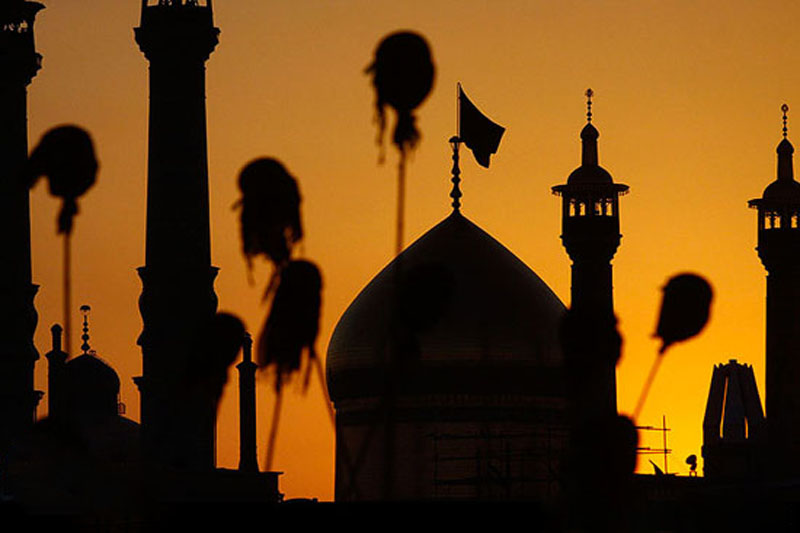
After the Ashura slaughtering, the Ahl al-Bayt of the Prophet, May Allah bless him and his family, were taken as prisoners to Kufa and thenward to Damascus. They were in a condition the sight of which would cause anyone’s soul to melt. All the Kufis went out to see the captives of their Prophet off. The men and the women wept for them. Imam Zayn al-Abidin, peace be on him, wondered at their attitude and said: “They killed us and are weeping over us!”
The wicked sinner, Shimr bin Dhil-Jawshan, ordered a rope to be put around Imam Zayn al-Abidin neck. The historians said: “Imam Zayn al-Abidin did not say even a word to the rude people who accompanied him, nor did he ask them for a thing throughout the journey, for he knew that they were wicked and ignoble, and that they would not respond to any of his requests.
The caravan of the captives arrived at a place near Damascus and stopped there because the Umayyads wanted to decorate the city to show their rejoicing and the victory which the grandson of Abi Sufyan gained over the grandson of Allah’s Apostle, may Allah bless him and his family.
WhenDamascus was fully decorated, the captives of the Ahl alBait of the Prophet, May Allah bless him and his family, were caused to enter it.
An elderly Syrian, who was misled by the false rumors, came near Imam Zayn al-Abidin, peace be on him, and said to him: “Praise belongs to Allah Who annihilated you and Who granted the governor the upper hand over you.”
Imam looked at the elderly Syrian. He understood that the elderly Syrian misunderstood the truth and was deceived by the false Umayyad mass media, so he asked him: “Have you read the Qur’a`n?”
“Yes,” answered the man.
“Have you read,” continued the Imam, “the verse saying: ‘ Say: I do not ask you for a reward for it except that you treat my kinsfolk with kindness,’ the verse saying: ‘ and give the (Prophet’s) kinsfolk their due rights,’ and the verse saying: ‘and be informed that whatever you earn by way of booty, for Allah belongs the fifth thereof and for the Messenger (of Allah) and for the (Prophet’s) kinsfolk’? “
The elderly Syrian admired Imam and said to him with a faint voice: “Yes, I have read all of them.”
Imam said to him: “We, by Allah, are the kinsfolk referred to in all these verses.” Then Imam asked him: “Have you read these words of Him, the exalted: ‘Allah only desires to take away uncleanness from you, O Ahl alBait (of the Prophet) and purify thoroughly’?”
“Yes,” was the answer.
“We are the Ahl alBait (of the Prophet) whom Allah singled out with the Verse of Purification.”
The elderly Syrian shook all over. He wished that the earth had swallowed him up before saying his words. Then he asked Imam: “I ask you in the Name of Allah, are you really them?”
“By our grandfather, Allah’s Apostle, may Allah bless him and his family, we are, without any doubt,” replied Imam.
It was then that the elderly Syrian fell on Imam Zayn al-Abidin’s hands kissing them. His tears flowed down his cheeks, and he said: “I dissociate myself before Allah from those who killed you!”
The elderly Syrian sought repentance from Imam from whatever rude remarks he had made earlier. So he, peace be on him, forgave him.
The True Hajj Karbala
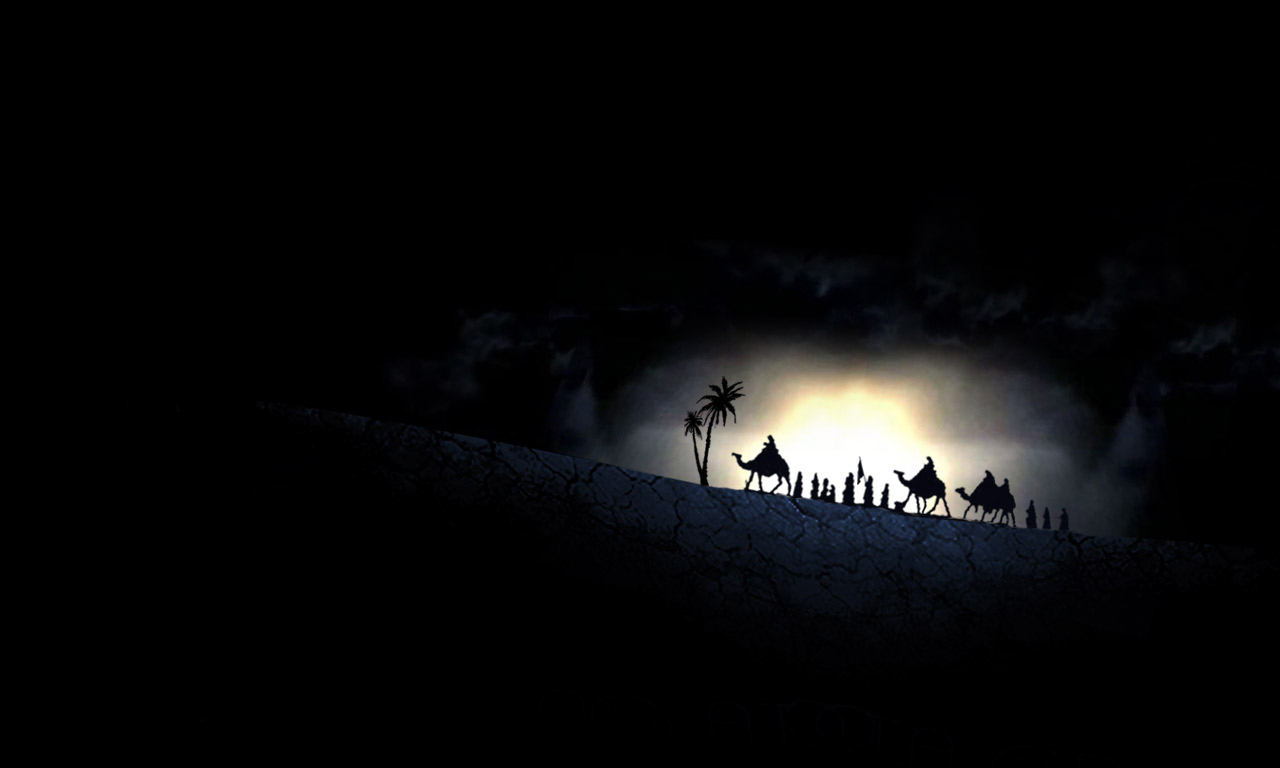
We learn from Imam Hussein that there was a more important goal for him to accomplish than completing the rituals of Hajj and risking bloodshed in the Haram. Actually, it would be an erroneous statement to say that the Imam skipped or cancelled his Hajj that year! In fact, Imam Hussein abandoned the ritualistic Hajj to perform the true essence of Hajj, which is embodied in his sacrifice and bloodshed on the plains of Karbala! Quite frankly, many of the ritualistic acts of Hajj symbolize the tragedy of Karbala, most notably the slaughter on xthe day of Eid al-Adha. Even though we celebrate that day out of gratitude that Allah spared the grief of father and son – Prophets Ibrahim and Isma’il (peace be upon them) – from the slaughter ordered by Him, our moment of joy doesn’t last long because it is soon replaced by the Great Slaughter (Dhibh ‘Adheem, as mentioned in 37:104-108 of the Qur’an) which is personified in Hussein ibn Ali. The grief we feel is further intensified as we remember the pain of separation between Imam Hussein and his son Ali Akbar, which was not spared like that of Isma’il and his father. The 10th of Dhil-Hijjah is only a few weeks away from the 10th of Muharram, reminding us of the true sacrifice that was offered in Karbala one month later!
When we think of Lady Hajra’s plight in fetching water for her son Isma’il, we are reminded of Imam Hussein’s pain of watching his youngest son, Ali Asghar, die out of thirst as he tries his best to seek water from the enemy by raising his infant in his arms in the hopes of moving their hearts and quenching his son’s thirst. Unlike Hajra, whose heart was solaced when a spring of water erupted to save her son’s life, Imam Hussein found nothing but a tri-headed arrow to pierce the neck of Ali Asghar! It is narrated that when Lady Hajra saw with her own eyes the marks of the knife on her son’s neck, she fainted from that scene; one can only imagine what overwhelming emotions Lady Fatima experienced when she witnessed her son’s headless body trampled by the hoofs of the horses after dying in a state of extreme thirst!
When we walk the distance between Safa and Marwa, we are reminded that it is the same distance as that between the holy shrine of Hazrat Abbas ibn Ali and his brother, Imam Hussein. This exact match in distance is certainly not a coincidence, and it reminds us of the challenge which Hazrat Abbas underwent as he sought to bring water to the thirsty children who had all their hopes pinned on him.
As the pilgrims rush to attain the blessings of the holy water of Zamzam, they are to be reminded of that water which Imam Hussein was denied until he died in the state of thirst, when even animals are given a last sip before being slaughtered!
The pilgrims in Hajj wear their clothes of Ehraam for the sake of Allah, and Imam Hussein also wore his clothes of Ehraam for His sake while abandoning the pleasures of this life – only for these “Ehraam” clothes to be drenched in his own pure blood to irrigate the tree of Islam!
The pilgrims stone the symbols of Shaytan numerous times to expel the whisperings of the devil which we are all prone to every second of every day. Hurr ibn Yazid al-Riyahi and Umar ibn Sa’d also experienced whisperings from Shaytan to attain the glory of power. However, Hurr stoned the whisperings of Shaytan and made the right decision to join Imam Hussein, while Umar followed the whisperings and became a Shaytan himself!
When the pilgrims go to Mina where the final sacrifice is given, this stage of Hajj symbolizes our intention to sacrifice everything beloved to us for Allah just like the Imam did, and the tents are a reminder of his family’s tents which were burned down and destroyed in Karbala after the Great Slaughter!
When the pilgrims visit the Holy Kaba and circumambulate it, they are reminded of the honor Allah gave Prophet Ibrahim in rebuilding this sacred House of God. They are also to be reminded of the rebuilding of the pure Mohammadan Islam by Imam Hussein when he offered his pure blood to give a jump-start to this Deen, which was on its way to corruption and deviation.